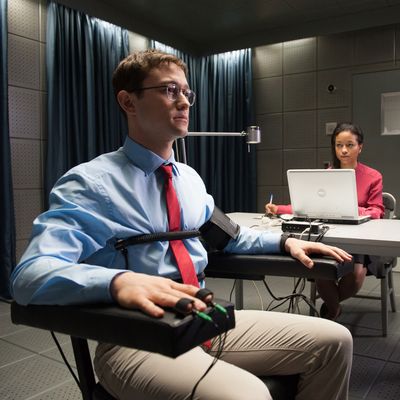
Oliver Stone’s Snowden is pretty good. Or pretty bad. It depends on your criteria. Stone has come to praise his subject, Edward Snowden, the CIA analyst turned classified-document dumper, not to raise — even tangentially — questions about Snowden’s character or the ramifications of his actions on national security. This is the same Snowden we met in Laura Poitras’s Oscar-winning documentary Citizenfour: the unequivocal patriot who can’t abide his government’s malpractice and heroically upends his life by turning over tens of thousands of classified documents to Poitras and journalist Glenn Greenwald. Poitras and Greenwald are major characters in Stone’s movie, which opens with the wary first meeting of Snowden (Joseph Gordon-Levitt), Poitras (Melissa Leo), and Greenwald (Zachary Quinto) in a luxe but dim and film-noir-shadowy Hong Kong hotel. As Snowden talks to Poitras’s camera, the movie flashes back to his aborted military training (broken legs demolished his hopes of joining the Special Forces), his CIA education, his romance with a lefty yoga teacher (Shailene Woodley), and his growing dismay over his agency’s unchecked powers of surveillance. It’s a classic political conversion narrative, not unlike Stone’s Born on the Fourth of July and even Wall Street.
Here I have to admit that I largely share Stone’s view of his protagonist. Although Snowden’s critics (not all of them raging neocons) have argued that his willy-nilly plundering of classified material has compromised Americans’ safety, Poitras’s Citizenfour made a better case for disclosure. Even if you will yourself to believe the best-case scenario — that the data mining of American citizens has been done responsibly — you’re still left with an unassailable truth: that the U.S. has constructed an immense, multi-tentacled, and historically unprecedented surveillance machine that can be used by even less scrupulous people for even less scrupulous reasons. The more you take the long view, the more you believe in the essential rightness of Snowden’s actions.
Which makes me wish that Stone had given the people who think otherwise more stature — that he’d made a real drama instead of a melodrama that Snowden’s detractors (and admirers, like me) can walk all over.
In interviews, the real Snowden can come off as a cold fish, but no matter how much Gordon-Levitt strives to immobilize his puppy-dog features, the eyes behind his glasses are warm. There isn’t a moment in Snowden in which you wonder about the nature of his idealism or the aptness of a patronizing colleague’s nickname for him: “Snow White.” You could even be forgiven for thinking that he has eventually come to embrace his girlfriend’s crunchy politics — though in reality Snowden’s Ayn Rand–style libertarianism has been remarkably consistent. (He’s contributed to Ron Paul in the past.) Stone is so intent on making Snowden an icon that he scrubs him of his nuances, his individuality.
He also turns the role of Snowden’s CIA mentor, filled by Rhys Ifans as “Corbin O’Brian,” into the glibbest kind of fop, a man so utterly sanguine about the constitutional integrity of the secret fisa court that he comes across as simpleminded. (Ifans has a fine American accent, but his affect is pure Colonel Blimp.) In one scene, Snowden is appalled when an NSA agent (Ben Schnetzer) who’s exuberantly invasive (“Facebook’s my bitch!”) uses an innocent Muslim woman’s own computer to watch her remove her burqa and strip to her underwear; Snowden later breaks off making love to his girlfriend to cover his laptop camera. (I went home and put black duct tape over mine — and you should, too.) Not once, though, does Stone suggest that the NSA and CIA’s surveillance equipment could actually be used to protect Americans instead of, say, blackmailing foreign officials on behalf of an unscrupulous military-industrial complex or using drones to wipe out unlucky families. Bush II was bad, Obama is worse: We should turn off the cameras because there’s nothing to see.
It should be said that Snowden isn’t the work of the conspiracy-monger who made JFK — which was wildly entertaining but nuts. Possessing concrete evidence that the CIA and NSA are, indeed, watching us all (Hi, guys! Like my review so far?), he has made a relatively sober film. It’s spooky, though. The soundtrack teems with humming wires and distant, ghostly modem squeals, and the lighting in the Hong Kong hotel seems more suitable for vampires than people poring over documents. Stone gets Expressionistic in one scene, in which an image of the planet crackling with electricity transforms into Snowden’s crackling eyeball. A short time later, Snowden falls to the floor with an epileptic seizure, as if the surveillance state had penetrated the blood-brain barrier.
If Gordon-Levitt makes Snowden a shade too likable, he’s still fun to watch. Leo’s bedraggled, nurturing Poitras is an astonishing feat of sympathetic mimicry, while Quinto makes the best case for Greenwald’s abrasiveness. Woodley’s scenes are hackneyed (her Lindsay complains to Snowden, “We don’t talk about anything anymore!”), but her bouncy, wood-sprite rhythms have their charm. Nicolas Cage plays the crusty caretaker of ancient computers — the voice of old-school integrity — with the jerkiness of a high-school actor, waving his arms under too-rigid shoulders. But he’s a welcome hoot. Any director who’d put Cage in the bowels of CIA headquarters must have a good sense of humor.
*This article appears in the September 19, 2016, issue of New York Magazine.


